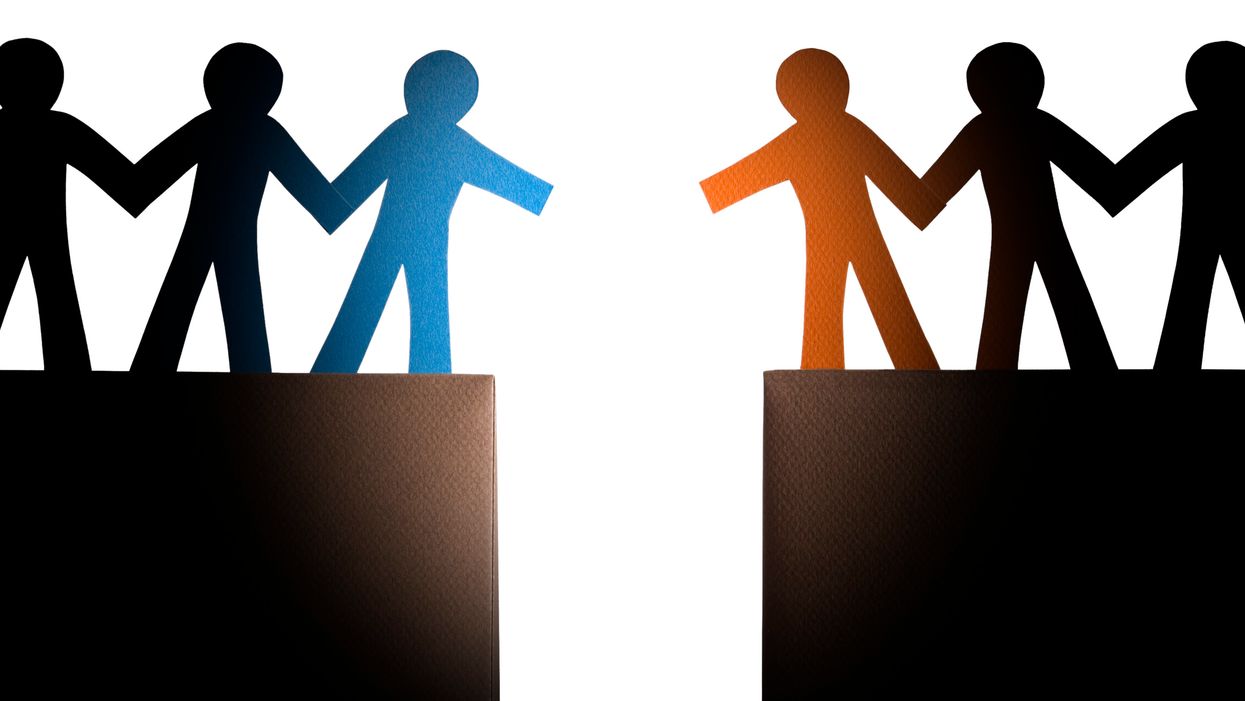Our country is reeling from a year of viral pandemic, racial reckoning, economic insecurity and political warfare. It can be hard to see the path forward through the fog. This is true for individuals, organizations and coalitions seeking to find our footing and best serve our fellow Americans through this fraught moment in our nation's history.
There are nearly 350 organizations across 37 states in the Listen First Coalition, which is working to mend our frayed social fabric by building relationships and bridging divides. It includes national, state and local nonprofits, schools, libraries, activist groups, media, and businesses — and two years ago spawned the National Conversation Project.
We've increasingly sought to work together, joining forces to reach farther and achieve an impact greater than any one of us could alone. Over the course of this tumultuous election year, we rallied as one behind the Weaving Community campaign. It launched in the early days of the coronavirus pandemic and has now reached more than 15 million, inspiring Americans of all stripes to start or deepen relationships in their communities.
We're now reflecting together on what we've experienced, what we've learned and the path forward.
While this month's election was not a resounding rebuke of division, it did result in the election of a new president who stubbornly centered his campaign on a message of unity.
In declaring victory Saturday night, Joe Biden pledged "to be a president who seeks not to divide, but to unify," and his speech was filled with turns of phrase so familiar to many of our organizations.
"It's time to put away the harsh rhetoric, lower the temperature, see each other again, listen to each other again. To make progress, we have to stop treating our opponents as our enemies. They are not our enemies. They're Americans," he said. "Our nation is shaped by the constant battle between our better angels and our darkest impulses, and what presidents say in this battle matters. It's time for our better angels to prevail."
This approach from the bully pulpit is great to hear and can only help. That said, we're under no illusions regarding the limits of rhetoric to heal our nation.
The people who do our work believe the ultimate answer is positive social connection, trust and relationships — something only possible with individuals in local communities that choose to heal together. But just as divisive rhetoric can inflame tribal animosities, increasing our distance from one another, unifying rhetoric can inspire those who are inclined and persuadable to open their eyes to and lean toward the other for a higher common purpose.
The necessary step from inspiration to action is where the many heroes of our movement are well positioned to serve.
While ushering in a hopeful new tone from the White House, this election also put a sobering truth in stark relief. We are — in ideology, culture, geography, and identity — two Americas, more evenly matched than expected and not so easily caricatured. The fault lines of 2016 deepened and widened in 2020 with no softening in sight. The previous election and the last four years were not an aberration but a confirmed reflection of the gulf in America.
Most of us are more sympathetic to one side of this gulf than the other, but that doesn't change the reality facing our mission. Many are experiencing pain, threat and fear — and are having a very human reaction to all that. Sadly, it's in our nature to channel those emotions into blame and grievance toward the other. Whatever our views of the relative merits of various grievances, people across the political spectrum feel under attack. The resulting defensive posture is not highly conducive to connection across differences.
So where does this reality leave us?
We face gargantuan, humbling obstacles. Our best efforts and messages will have limited effect in convincing those currently invested in tribal warfare to change their emotion-driven approach. But we are perfectly equipped to inspire and engage those open to or already seeking a different way — a way out of the tribal doom loop for themselves, their communities and their country.
Surveys and anecdotal experience tell us that as the environment gets darker, more people look for light. Our coalition is here to magnify and manifest the light.
Everybody doing this work has experienced a moment when our tribal interests were surpassed by concern for the health of the collective — for the fabric of our society. While ready and waiting for each person to have such a moment, we're seeking to inspire and accelerate such revelations.
We can open eyes to the possibility of transforming a rising tide of rancor, deepening division and increasing isolation into a wave of respect, connection and belonging.
We can equip Americans with foundational skills and opportunities to weave a stronger social fabric and build bridges across our differences so Americans of all stripes can come together and solve our shared challenges. In this, we translate desire and intention into productive, multiplying action.
If our society is on a downward spiral into a dark hole, our groups are throwing down the rope ladders of rescue.
Mending the frayed fabric of America with trust and empathy won't magically happen. It will be fueled by visionaries, leaders, experts, organizers, methods and mass offerings of skills and opportunities.
We invite all Americans looking for a way out of tribalism, animosity and mistrust to join us. We're here for you.



















